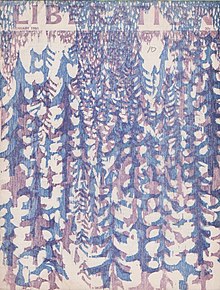
Summary
Liberation was a 20th-century pacifist journal published 1956 through 1977 in the United States. A bimonthly and later a monthly, the magazine identified in the 1960s with the New Left.[1]
 | |
| First issue | April 1956 |
|---|---|
| Final issue | 1977 |
| Based in | New York City, New York, U.S. |
| Language | English |
| ISSN | 0024-189X |
| OCLC | 856110 |
History edit
Liberation was founded, published, and edited by David Dellinger, Bayard Rustin, Sidney Lens, Roy Finch, and A. J. Muste[2] out of New York City[3][4] and Glen Gardner, New Jersey.[2] Muste brought funding from the War Resisters League.[3][5] For Rustin, the magazine was a major commitment of time and energy, raising money and meeting every week with Muste.[6] He wrote to Martin Luther King Jr.,[7] who later wrote for the magazine. The June 1963 issue contained the full publication of King's "Letter from Birmingham Jail", the first version with that title.
Liberation: An Independent Monthly published its first issue in April 1956.[8]
The editorial positions of the magazine were somewhat comparable to those of Dissent and Studies on the Left.[9] David Dellinger's support of the Cuban Castro regime caused a rift at the magazine, with philosophy professor Roy Finch resigning as an editor.[10] Editorially, Liberation supported the Cuban Revolution, and published C. Wright Mills' article "Listen, Yankee!"[11] The magazine supported Students for a Democratic Society and opposed the Vietnam War.[12]
The magazine supported Fellowship of Reconciliation (FoR) organizers, and its editorial offices at times served as a clearinghouse for activists conducting non-violent resistance.[13]
Liberation occasionally ran investigative pieces. In early 1965, the magazine ran long articles by Vincent Salandria challenging the conclusions of the Warren Commission. In 1975 it published an article by Fred Landis on psychological warfare by the CIA in Chile.
A poem by Louis Ginsberg, father of Allen Ginsberg, was published in the magazine.[14] Children's book author Vera Williams made the artwork for many of the covers.[15]
By 1977 the magazine was edited by Jan Edwards and Michael Nill out of Cambridge, Massachusetts. It ceased publication not long after the departure of Dellinger.
Seeds of Liberation, a collection of Liberation articles, was edited by Paul Goodman and published in 1965.[16][17]
Legacy edit
Liberation, together with Dissent, anticipated changes in the 1950s American political left, such as the early civil rights movement and nonviolent protest.[18]
References edit
- ^ Staughton Lynd; Andrej Grubačić; Denis O'Hearn (2008). Wobblies & Zapatistas: Conversations on Anarchism, Marxism and Radical History. PM Press. ISBN 978-1-60486-041-2.
- ^ a b McReynolds, David (September 2004). "Remembering Dave Dellinger". Against the Current (112). Retrieved April 17, 2016.
- ^ a b James Tracy, ed. (1996). Direct Action: radical pacifism from the Union Eight to the Chicago Seven. University of Chicago Press. ISBN 978-0-226-81127-7.
- ^ Epstein, Barbara (1991). Political Protest and Cultural Revolution: Nonviolent Direct Action in the 1970s and 1980s. University of California Press. p. 284. ISBN 0520914465. Retrieved April 17, 2016.
roy finch muste dellinger.
- ^ Frank Kusch (2001). All American Boys: draft dodgers in Canada from the Vietnam War. Greenwood Publishing Group. ISBN 978-0-275-97268-4.
- ^ John D'Emilio, Lost Prophet: The Life and Times of Bayard Rustin, New York: Free Press, 2003, p. 216.
- ^ Stewart Burns, Daybreak of Freedom: The Montgomery Bus Boycott, University of North Carolina Press, 1997.
- ^ Hunt 2006, p. 113.
- ^ Staughton Lynd, Andrej Grubacic, Wobblies and Zapatistas: Conversations on Anarchism, Marxism and Radical History, PM Press, 2008, p. 36.
- ^ Avrich 1995, p. 230.
- ^ "April 9, 2007". The Nation. Retrieved 2011-05-24.
- ^ Nigel Young, An Infantile Disorder?: The Crisis and Decline of the New Left, Routledge & Kegan Paul, 1977.
- ^ Howard Brick, Age of Contradiction: American Thought and Culture in the 1960s, Twayne, 1998.
- ^ Allen Ginsberg (ed. Bill Morgan), The Letters of Allen Ginsberg, Da Capo Press, 2008, p. 243.
- ^ "Vera Baker Williams Interview by Connie Bostic". BMCS. Retrieved 2019-08-16.
- ^ Chase 1965.
- ^ Kopkind 1965.
- ^ Unger 1974, pp. 16–17.
Bibliography edit
- Avrich, Paul (1995). Anarchist Voices: An Oral History of Anarchism in America. Princeton: Princeton University Press. ISBN 978-0-691-03412-6. OCLC 68772773.
- Chase, Edward T. (November 12, 1965). "Rev. of Seeds of Liberation". Commonweal. 83 (6): 194–195. ISSN 0010-3330 – via Gale Biography in Context.
- Hunt, Andrew E. (2006). David Dellinger: The Life and Times of a Nonviolent Revolutionary. New York: NYU Press. ISBN 978-0-8147-3638-8.
- Kopkind, Andrew (March 20, 1965). "The Politics of Avoiding Politics (Rev. of Seeds of Liberation)". New Republic. Vol. 152, no. 12. pp. 20–22. ISSN 0028-6583.
- Unger, Irwin (1974). The Movement: A History of the American New Left, 1959-1972. New York: Harper and Row. ISBN 978-0-06-046726-5.
- Wagstaff, Thomas (1974). "Liberation". In Conlin, Joseph R. (ed.). The American Radical Press, 1880–1960. Westport, Connecticut: Greenwood Press. pp. 681–688. ISBN 0-8371-6625-X.


